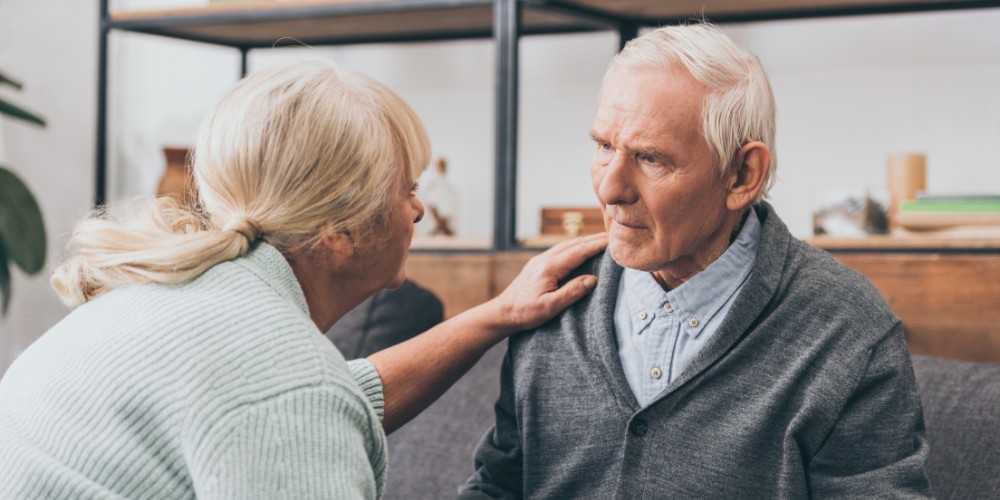As a well-established 5-star care agency, A1 Care understands the profound impact of loneliness on our loved ones.
We serve clients in the Bournemouth, Christchurch, and Poole (BCP) areas with dedication. Our services include high-quality domiciliary and live-in care, focusing on physical and emotional well-being.
Our mission extends beyond primary care to actively alleviate the feelings of loneliness that many of our loved ones experience.
Understanding Loneliness
Our approach at A1 Care begins with understanding and acknowledging feelings of loneliness. Recognising and validating these feelings is crucial, which our caregivers are extensively trained to do.
They create an understanding and compassionate environment where your loved ones can freely express their emotions without fear of judgement.
Loneliness is a complex emotional state, often resulting from perceived social isolation and a lack of connection. Its impact is linked to emotional distress and many physical health issues, including an increased risk of heart disease, stroke, and premature death.
Additionally, loneliness can exacerbate pre-existing mental health conditions like depression and anxiety.
Companionable Care: Emotional Support and Beyond
Caregiving is a multifaceted role—it extends beyond merely providing physical care. Caregivers offer emotional support, companionship and foster a sense of belonging.
These factors are integral to combating feelings of loneliness. Our philosophy at A1 Care involves the following:
- Providing companionable care, where activities such as sharing a cup of tea
- Watching a favourite TV show
- Simply sitting in comfortable silence can make a world of difference.
Frequently Asked Questions for Loneliness
Q1: What is loneliness, and why is it a concern for older adults?
Loneliness is an emotional state characterised by isolation, emptiness, and disconnection from others. It can be incredibly challenging for older adults due to living alone, loss of friends or family, or physical limitations that prevent active socialisation.
Q2: How can carers help combat loneliness in older adults?
Carers play a critical role in combating loneliness. They provide companionship and meaningful conversations, helping the elderly feel heard and valued. Carers can also assist in maintaining connections with loved ones through technology and encourage participation in social activities and community events.
Q3: How does A1 Care’s approach address loneliness?
Our caregivers are thoroughly trained to recognise and validate feelings of loneliness. Our services also include:
- Helping clients stay connected with their loved ones
- Celebrating special occasions to make them feel valued
- Fostering community participation.
Q4: What specific training do A1 Care’s carers receive for combating loneliness?
A1 Care’s carers undergo comprehensive in-house training, monthly refresher courses, and specialised training to understand and address loneliness in our clients. This training equips them with the skills and knowledge to build meaningful connections with clients and promote their social engagement.
Q5: What activities does A1 Care organise to foster socialisation and community engagement?
A1 Care organises yearly community events that allow our clients to socialise and feel part of the community. We also facilitate clients’ involvement in local events and gatherings suitable for them.
Q6: How does A1 Care facilitate connections with clients’ loved ones?
A1 Care leverages technology, like Facetime, to help clients maintain close contact with their families and friends. Regular, meaningful interactions can significantly alleviate feelings of social isolation and loneliness.
Q7: Can you share any success stories where A1 Care’s services helped combat loneliness in clients?
We have received numerous testimonials from families expressing gratitude for our exceptional care. Many have mentioned the significant improvement in their loved ones’ mental and emotional well-being thanks to our dedicated efforts in combating loneliness.
Please visit our reviews page on homecare.co.uk for detailed success stories.
Cultivating Connections and Celebrating Life
Open communication is crucial in combating loneliness.
Our caregivers engage in meaningful conversations, assist in maintaining connections with loved ones through technology such as Facetime, and celebrate special occasions like birthdays with thoughtful gestures such as flowers and cake.
Because these small yet significant actions help build strong relationships, enhancing our clients’ sense of belonging and value.
The Benefits of At-Home Care for Loneliness
It’s essential to recognise that while care homes can provide many benefits, they may inadvertently contribute to feelings of loneliness and isolation in older adults.
In a care home environment, the sheer number of residents often means that individual attention can be limited, and personalised care is rarely achievable.
So, the lack of deep, meaningful interactions can lead to isolation, even amidst a crowd.
Furthermore, the upheaval of moving into a care home can cause distress and disorientation, potentially intensifying feelings of loneliness. Individuals often have to leave behind their familiar surroundings and routines, which can lead to a profound sense of loss and displacement.
Our Solution
At-home care offers a compelling alternative solution. It allows individuals to stay within the comfort and familiarity of their homes while receiving the care they need.
This approach provides a sense of security and allows for care that is entirely tailored to the individual’s needs, preferences, and schedule.
At A1 Care, our at-home care services are designed to ensure each client receives undivided, one-on-one attention. This model facilitates more profound connections between the caregiver and client, fostering a relationship that can effectively combat feelings of loneliness and isolation.
Loneliness in the UK: Unveiling the Facts
According to Carers UK, loneliness can have significant societal impacts. In the UK alone, 1.2 million chronically lonely older people are at risk.
The societal cost of loneliness due to health costs and pressure on local services can reach up to £12,000 per person over the next 10 years.
However, despite these sobering facts, there is a clear path to alleviating loneliness through care strategies that emphasise human connection, personal attention, and community engagement.
Our care strategies focus on meaningful one-on-one interactions, ensuring that our clients never face loneliness alone, contributing to a healthier, more connected society.
Fostering Community Engagement
Social engagement is another effective way to mitigate loneliness.
At A1 Care, we deeply understand the BCP area and Hampshire communities and encourage and facilitate participation in suitable local events and gatherings.
Our commitment extends to organising yearly community events, aiming to foster a sense of belonging and community for our clients.
Client Testimonials: A Reflection of A1 Care’s Impact
Feedback from those we have been privileged to assist is crucial.
One reviewer on homecare.co.uk states, “The staff are friendly, efficient, and knowledgeable. I feel reassured knowing they are caring for my mother”, reflecting our unwavering commitment to offering high-quality care.
Moreover, another highlights our impact, saying, “The carers are truly exceptional. They’ve not just made my father’s life better, but our entire family’s.”
These testimonials underscore our mission of providing care, forming meaningful relationships, and fostering a sense of community.
Expanding Our Services: A1 Care in Hampshire
As A1 Care expands its live-in care services into Hampshire, we are committed to replicating the high standard of care we offer in the BCP area.
With A1 Care, you can rest assured that your loved ones are in compassionate, capable hands, ensuring they never face loneliness alone.
We’re offering a 2-week trial at 50% off; you can redeem this by submitting our form




